(word完整版)上海牛津英语五年级下册语法点整理
沪教牛津版五年级英语下册全册知识点汇总清单
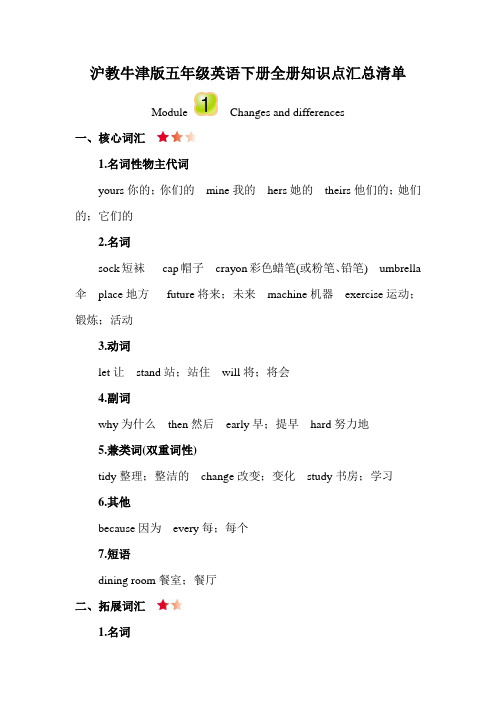
沪教牛津版五年级英语下册全册知识点汇总清单Module Changes and differences一、核心词汇1.名词性物主代词yours你的;你们的mine我的hers她的theirs他们的;她们的;它们的2.名词sock短袜cap帽子crayon彩色蜡笔(或粉笔、铅笔)umbrella 伞place地方future将来;未来machine机器exercise运动;锻炼;活动3.动词let让stand站;站住will将;将会4.副词why为什么then然后early早;提早hard努力地5.兼类词(双重词性)tidy整理;整洁的change改变;变化study书房;学习6.其他because因为every每;每个7.短语dining room餐室;餐厅二、拓展词汇1.名词nail钉子second秒(时间单位)mess脏乱;不整洁2.动词drop使落下;掉落stick粘贴;粘住3.形容词enough足够的more更多的4.副词twice两次easily容易地5.兼类词(双重词性)north北方;向北south南方;向南6.短语tidy up把……整理好(be) full of装满……;充满…… a few几个;一些wild goose大雁(复数wild geese) in the future将来in front of在……前面take a photo拍照wear glasses戴眼镜(be)weak in不擅长not …any more不再all day一天到晚do exercise做运动三、核心句型1.—Are they yours?它们是你的?—No,they aren’t. 不,它们不是。
解读: 问句是一个一般疑问句,用来询问某物的归属,有肯定和否定两种回答。
举一反三: —Are these crayons yours?这些蜡笔是你的吗?—No,they aren’t. 不,它们不是。
沪教牛津版五年级下册单元知识点一览表
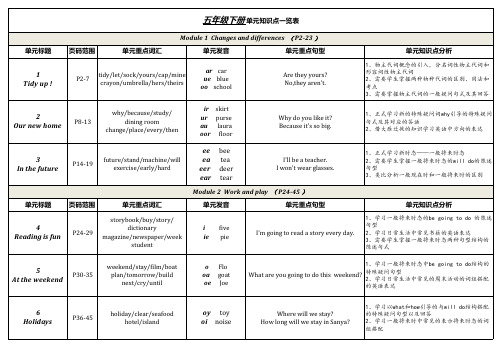
1、学习以what和how引导的与will do结构搭配 的特殊疑问句型以及回答 2、学习一般将来时中常见的表示将来时态的词 组搭配
单元标题
7 Open day
页码范围
单元重点词汇
P46-51
meet/school gate/art room hall/finally/meeting room
show
五年级下册 单元知识点一览表
单元标题
1 Tidy up !
页码范围
单元重点词汇
Module 1 Changes and differences ( P2-23 )
单元发音
单元重点句型
P2-7
tidy/let/sock/yours/cap/mine crayon/umbrella/hers/theirs
1、正式学习新时态——一般将来时态 2、需要学生掌握一般将来时态的will do的陈述 句型 3、类比分析一般现在时和一般将来时的区别
单元知识点分析
1、学习一般将来时态的be going to do 的陈述 句型 2、学习日常生活中常见书籍的英语表达 3、需要学生掌握一般将来时态两种句型结构的 陈述句式
You should take some medicine. You shouldn't go to bed late.
1、学习日常生活中常见的不适症状以及需要注 意事项的英语表达 2、进一步学习以情态动词should引导的表示建 议的祈使句型
Module 4 Things we enjoy ( P68-87 )
1、学习日常生活中常见的节假日的英文表达
11 Chinese fesivals
P74-79
festival/important/call end/village/last
最新牛津英语五年级下册英语语法知识汇总-(1)

英语语法知识汇总-五B 第一课时——名词复数重点:名词的复数变化规则。
难点:灵活运用。
这里强调两点:不可数名词都默认为单数,所以总是用is.1.一般+s 如map→maps , bag→bags 等2.特殊:以s,x,sh,ch 结尾的单词+es 如bus→buses , watch→watches 等;3.以辅音字母+y 结尾,去掉y 加上ies ,以元音字母+y 结尾加上s4.以f 或fe 结尾,去掉f/fe 加上ves 。
如 knife→knives leaf→leaves wolf→wolves wife→wives life→lives thief→thieves5.有时可数,有时不可数:典型例词:fish 当它解释为鱼肉时是不可数名词,当它解释成同一种鱼时,单复数同形,复数即为fish ,当它解释为不同一种鱼时,+es,即为fishes.6.以o 结尾,a) photo→photos ,piano→pianos,radio→radios ,zoo→zoos b )加es 的名词有:potato→potatoes tomato→tomatoes7.特殊词:child---children(小孩) man--men (男人) woman--women(女人) 8.单复数同形(单数和复数一样)people(人)sheep(绵羊) deer (鹿)) 9.国人变复数 :口诀:中日不变英法变,其余s 加后面。
Chinese--Chinese Japanese--JapaneseEnglishman--Englishmen Frenchman--Frenchmen American--Americans 等等10. 字母、数字、引语、缩略语变复数,在其后加s 或's 。
eg. There are two t's in the word “bottle".各种不同情况 变化方法 例词一般情况直接加-sbook-books bag-bags cat-cats bed-beds 以s. x. sh. ch结尾加-esbus-buses box-boxes brush-brushes watch-watches peach —peaches glass--glasses以“辅音字母+y”结尾变y 为i, 再加-es family-families study--studies以“f 或fe”结尾变f 或fe 为v ,再加-esknife-knives不规则名词复数man-men woman-women policeman-policemen policewoman-policewomen mouse-mice foot-f eet child-children fish-fish Chinese-ChineseThere are two 1's i n the number “2011".一、用所给的单词的复数的正确形式填空: 1> There are three ______(chair) in the classroom. 2>These _______(tomato) are red.3>My brother looks after two ______(baby) 4> My father likes to eat _______(potato). 5>Chinese ______(people)like to eat noodles. 6>I have a lot of ______(toy) in my bedroom.7>I help my mother wash ______(dish) in the kitchen. 8>I have two ______(pencil-box).9>There are some ______(bus)in the street. 10>Peter has eight _____(foot). 二、选择填空( )1.I can see three ________ in the zoo. A monkeys B monkeyes C monkey ( )2.The pig has four ______. A. foot B. feet C. foots( )3.My two brothers are both ______. A. policeman B. policemans C. policemen ( )4.I can see ten _____ in the picture. A. sheep B. dog C. pig( )5.The _____ has three__. A. boys, watches B. boy, watch C. boy, watches ( )6.Can you see _______on the plate? A. bread B. breads C. breades( )7.The girl often brushes her_____ before she goes to bed. A. tooth B. tooths C. teeth ( )8.Mr Black often drink some _________.A. milk B. milks kes ( )9.There are some _____on the floor. A. child B. water C. books( )10..Lucy will show us some new ____ of hers. A. photo B. photos C. Photoes 第二课时——2、人称代词和物主代词重点:区分人称代词和物主代词。
上海牛津英语五年级下册语法点

上海牛津英语五年级下册语法点Document serial number【NL89WT-NY98YT-NC8CB-NNUUT-NUT108】上海牛津英语五年级下册语法点整理动词的形式:一、动词后面加上ing:①、现在进行时:表示某个动作正在发生或进行。
它的构成方式是:主语+be+动词ing〔现在分词〕形式,有时会要求自己加上be动词(is,am,are)。
句子中经常会出现look,listen,now……等词。
现在进行时的变化肯定句式:主语+be(am,is,are)+动词ing+其它.否定句式:主语+be(am,is,are)+not+动词ing+其它.一般疑问句:Be(am,is,are)+主语+动词ing+其它?特殊疑问句:疑问词(what,where…)+be(am,is,are)+主语+动词ing+其它?对现在进行时的特殊疑问句的回答,它不可以用Yes或No直接作答,要根据实际情况回答。
练习:1.Whatareyou_________(do)nowI___________(eat)bread.2.It’snineo’clock..Myfather_______________(work)intheoffice.3.Look,theboy____________(put)theplateonhisfinger.4.__________he__________(clean)theclassroomNo,heisn’t.He____________(play).5.WhereisMakHe___________(run)onthegrass.6.Listen,who___________(sing)inthemusicroomOh,Mary___________(sing)there.②like(s),go,dosome,后面的动词加ing.如:1.Ilike(play)football,butmyfatherlikes(play)chess.2.Let’sgo(swim).二、动词后面加s/es.这就有关一种时态:一般现在时。
牛津上海版五年级下册英语必背笔记

五年级下册英语必背笔记U11.tidy it up把它整理好2.look at 看3.What a mess!多么乱啊!4.Let's=Let us 让我们5.what什么why为什么where在哪儿who谁whose谁的when什么时候which哪一个how 怎么样6.those那些 that那个these这些 this这个7.I'm=I amhe/she/it/单数/不可数名词+isyou/we/they/复数名词+are8.Paul's保罗的9.put…on 把…放到…put on穿上10. There is 有就近原则There are 有就近原则eg. There is a dog and three cats. 有一只狗和三只猫。
There are three cats and a dog. 有三只猫和一只狗。
11.too 也(放后面)also也(放中间)12.now 现在13.clean and tidy 干净整洁14.You're welcome. 不客气,不用谢15.a magic stone 一个神奇的石头16.on the table在桌子上17.be full of充满、装满18.ask问answer回答19.drop the box 使盒子掉落20.all都,所有的(三个或三个以上)both都(两个)21.on the floor在地板上22.he他(主格)him他(宾格)his他的23.mine我的 his 他的 hers她的 yours你的、你们的 ours我们的 theirs他们的24.try it试试它25.near附近26.stick to粘住27.in a few seconds几秒钟后second第二、秒28.again再一、又一U21.our我们的 their他们的 her她(的)2.at home在家3.Do you like…?你喜欢…吗?Yes,l do.No,l don't.4.living room客厅dining room餐厅study书房、学习 bedroom卧室 kitchen厨房 bathroom浴室5.Why do you like it?你为什么喜欢它?Because it's…因为它…6.so big好大7.What about you?你呢?8.quiet安静的 quite相当、确实9.read and write读和写10.there那里11.Do you know why?你知道为什么吗?12.in the garden在花园里13.all day一天到晚14.wild goose 大雁复数为:wild geese15.life生活复数为:livesbusy lives忙碌的生活16.from…to …从…到…17.one place一个地方18.another另一个19.change改变、变化20.twice两次21.spring春天 summer夏天 autumn秋天 winter冬天22.east东方 south南方 west西方 north北方23.move around四处移动24.so much如此多so所以25.cannot=can't不能26.enough food足够的食物27.then然后28.warm温暖的29.fly back飞回来U31.in the future在未来2.know about知道关于3.I'll=I will我将won't=will notI will be a teacher. 我将成为一名老师。
沪教牛津版(深圳用)五年级英语下册Module1Unit1Tidyup!知识梳理

沪教牛津版(深圳用)五年级英语下册Unit 1 Tidy up!整理好! 知识梳理语块整体记忆习惯搭配/短语:1. look at看一看2. tidy up把...整理好3. put...on...把...放到...上惯用语:1. What a mess!真是一团糟!2. Sure!当然可以!3. You’re welcome!不用客气!句型框架:1. Let's...2. Are they...?3. Whose...is this/are those?4. Can you....?5. There is/are...6. Thank you for...词汇全解mess 脏乱;不整洁;短语make a mess巧记me(我)+ss=mess(脏乱;不整洁)形近miss想念;错过let 让;形近leg腿,pet宠物,wet潮湿的,get获得,set设置;近音light n.光第三人称单数lets;用法let后接人称代词时,人称代词要用宾格形式。
例句Let's play football.让我们踢足球吧。
tidy 整理;第三人称单数tidies;过去式tidied;形近tiny微小的;极小的动词-ing形式tidying;其他词义tidy收拾;转化tidy adj.(形容词)整洁的短语tidy up把……整理好例句Do you often tidy your room?你经常整理你的房间吗?sock短袜复数socks;形近cock公鸡短语a pair of socks一双短袜例句Where are my socks?我的短袜在哪里?yours你的;你们的;形容词性物主代词your你的;你们的联想mine我的,ours我们的,his他的,hers她的巧记your(你的;你们的)+s=yours(你的;你们的)例句My ruler is longer than yours.我的尺子比你的长。
牛津英语五年下册知识点梳理,推荐文档(2021年整理)
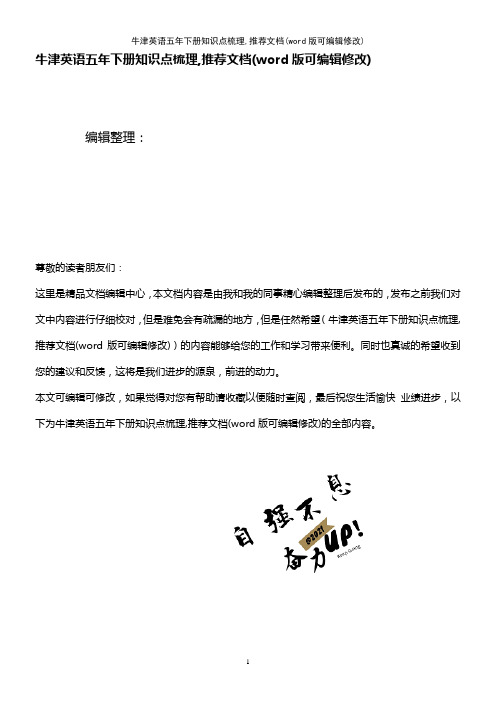
牛津英语五年下册知识点梳理,推荐文档(word版可编辑修改)编辑整理:尊敬的读者朋友们:这里是精品文档编辑中心,本文档内容是由我和我的同事精心编辑整理后发布的,发布之前我们对文中内容进行仔细校对,但是难免会有疏漏的地方,但是任然希望(牛津英语五年下册知识点梳理,推荐文档(word版可编辑修改))的内容能够给您的工作和学习带来便利。
同时也真诚的希望收到您的建议和反馈,这将是我们进步的源泉,前进的动力。
本文可编辑可修改,如果觉得对您有帮助请收藏以便随时查阅,最后祝您生活愉快业绩进步,以下为牛津英语五年下册知识点梳理,推荐文档(word版可编辑修改)的全部内容。
五年级下册知识点Unit1词组:1。
在星期一上午 on Monday morning 2。
今天下午 this afternoon3 .三节数学课 three Maths lessons4 。
新学期 the new term5. 第一节课 the first lesson 6 .立刻、马上 at once7 .10门学科 ten subjects 8 .一节有趣的课 an interesting lesson 9 。
你呢? How about you? 10 .在一周内 in a week11 .欢迎回来 welcome back 12。
我的课程表 my timetable13。
在星期三 on Wednesday 14 .星期天晚上 Sunday evening15 .这个学期 this term 16. 上一堂艺术课 have an Art lesson17 。
每天 every day 18.一个窍门 a trick19 .让我想想 let me see 20 .非常 very much句型:1.我们可以用下列句型来谈论学习的科目、课表,如:What lessons do you have in the morning/afternoon? 上午/下午你们有什么课程?What lessons do you have on Monday/ Wednesday? (注意:在星期几用on)星期一/星期三你们有什么课程?What subject do you like?你喜欢什么科目?I like English. How about you?我喜欢英语.那你呢?I like Science. 我喜欢科学.2.我们想要询问今天是星期几时,可以用;—- What day is it today? —— It’s Monday。
牛津沪教版小学英语五年级下册知识点总结
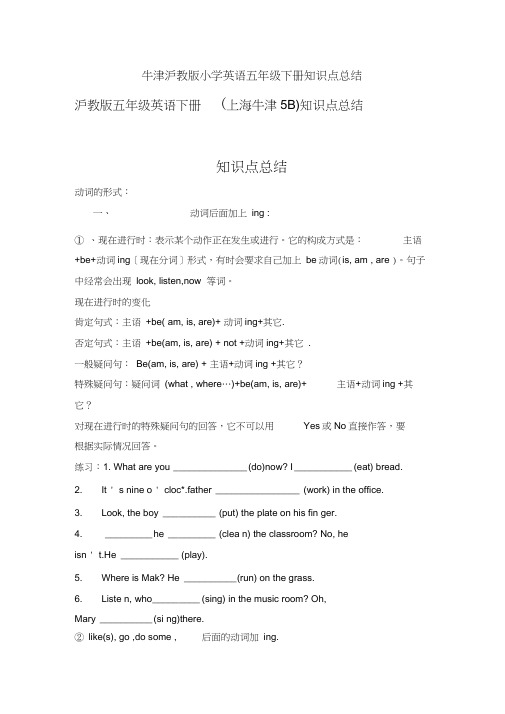
牛津沪教版小学英语五年级下册知识点总结沪教版五年级英语下册(上海牛津5B)知识点总结知识点总结动词的形式:一、动词后面加上ing :①、现在进行时:表示某个动作正在发生或进行。
它的构成方式是:主语+be+动词ing〔现在分词〕形式,有时会要求自己加上be动词(is, am , are )。
句子中经常会出现look, listen,now 等词。
现在进行时的变化肯定句式:主语+be( am, is, are)+ 动词ing+其它.否定句式:主语+be(am, is, are) + not +动词ing+其它.一般疑问句:Be(am, is, are) + 主语+动词ing +其它?特殊疑问句:疑问词(what , where…)+be(am, is, are)+ 主语+动词ing +其它?对现在进行时的特殊疑问句的回答,它不可以用Yes或No直接作答,要根据实际情况回答。
练习:1. What are you ______________ (do)now? I ___________ (eat) bread.2. It ' s nine o ' cloc*.father ________________ (work) in the office.3. Look, the boy __________ (put) the plate on his fin ger.4. _________ he _________ (clea n) the classroom? No, heisn ' t.He ___________ (play).5. Where is Mak? He __________ (run) on the grass.6. Liste n, who _________ (sing) in the music room? Oh,Mary __________ (si ng)there.②like(s), go ,do some , 后面的动词加ing.如:1.1 like (play ) football, but my father likes (play) chess.2. ____________ Let ' s go wim).二、动词后面加s/es.这就有关一种时态:一般现在时。
完整word版牛津英语五年级下册知识点整理

牛津英语上海版五年级下册知识点整理Module1 Using my five sensesUnit1 What a mess生词:notebook paints crayon school bag tape glue brush音标:语法:Whose...? It's mine/yours/his/hers/ours/theirs. They're...Unit2 Watch it grow 生词:dogpuppy duck butterfly chick chicken duckling caterpillar语法:...was/were...Unit3 How noisy 生词:motorbike bus car drill lorry音标:?? ///??/ suretoy boy oy ure our enjoy joytour oor join oi noisepoor pointtoilet语法:...did...牛津英语上海版五年级下册知识点整理Module2 My favorite thingsUnit1 Food and drinks生词:Meat: pork beef chicken fishVegetables: tomatoes potatoes carrots cabbages beansFruit: apples oranges bananas grapesStaple Food: rice noodles breadDrinks: juice water milk tea语法:What did you have for...? I had...FilmUnit2生词:seat ticket ticket office entrance exit语法:Shall we...Unit3 school subject 生词:Music Maths Chinese English Art IT PE牛津英语上海版五年级下册知识点整理Module3 Things around usUnit1 Signs生词:telephone toilet restaurant exit entranceNo smoking No swimming Don't litter Don't walk on the grass音标:/r//l/ redl radio like late r grassblack grow blouse语法:What does this sign say/mean? It says/means wecan/can't/mustn't/shouldn't..Unit2 Weather 生词:rain/rainy wind/windy Cloud/cloudy sun/sunny ℃/thirty degrees 30snow/snowy storm/stormy fog/foggy音标:/e/ θ/ / these think th they ththird father mouth mother month语法:What's the weather like? What's the temperature?It's...(weather).It's...(temperature).Unit3 Changes 生词:sofa cushion bed mirror lamp bookshelf Cupboard语法:What can we do?牛津英语上海版五年级下册知识点整理Module4 More things to learnUnit1 Museum生词:Science museum art museum history museumInsect museum car museum railway museum语法:Which museum do you want to visit?I want to visit ...Why?Because...Unit2 Western holiday生词:Christmas Easter Halloween Thanksgiving 语法:When is ...? It's on ... What do people do on this holiday?Unit3 story time 生词:castle giant。
(word完整版)上海牛津英语五年级下册语法点整理(2).docx

上海牛津英语五年级下册语法点整理的形式:一、后面加上ing :①、在行:表示某个作正在生或行。
它的构成方式是:主 +be+ing〔在分〕形式,有会要求自己加上be ( is, am , are )。
句子中常会出look, listen, now⋯⋯等。
在行的化肯定句式:主 +be( am, is, are)+ing+ 其它 .否定句式:主 +be(am, is, are) + not +ing+ 其它 .一般疑句: Be(am, is, are) + 主 +ing + 其它?特殊疑句:疑 (what , where ⋯)+be(am, is, are)+ 主 +ing + 其它?在行的特殊疑句的回答,它不可以用Yes 或 No 直接作答,要根据情况回答。
: 1.What are you _________(do) now? I ___________(eat) bread.2.It ’ s nine o’. clockMyfather._______________(work) in the office.3.Look, the boy____________(put) the plate on his finger.4.__________he__________(clean) the classroom? No, he isn’ t. He____________(play).5.Where is Mak? He___________(run) on the grass.6.Listen, who___________(sing) in the music room? Oh, Mary___________(sing) there.② like(s), go , do some , 后面的加 ing.如: 1. I like(play ) football, but my father likes(play) chess.2.Let’s go(swim).二、后面加s/es. 就有关一种:一般在。
新沪教牛津版五年级下册小学英语全册单元知识点小结
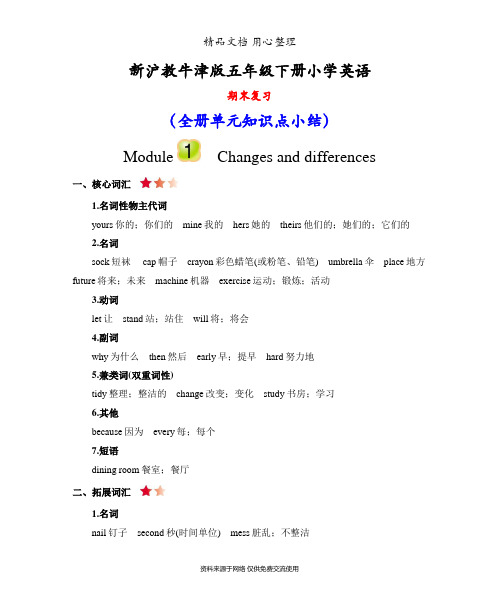
新沪教牛津版五年级下册小学英语期末复习(全册单元知识点小结)Module Changes and differences一、核心词汇1.名词性物主代词yours你的;你们的mine我的hers她的theirs他们的;她们的;它们的2.名词sock短袜 cap帽子crayon彩色蜡笔(或粉笔、铅笔)umbrella伞place地方future将来;未来machine机器exercise运动;锻炼;活动3.动词let让stand站;站住will将;将会4.副词why为什么then然后early早;提早hard努力地5.兼类词(双重词性)tidy整理;整洁的change改变;变化study书房;学习6.其他because因为every每;每个7.短语dining room餐室;餐厅二、拓展词汇1.名词nail钉子second秒(时间单位)mess脏乱;不整洁2.动词drop使落下;掉落stick粘贴;粘住3.形容词enough足够的more更多的4.副词twice两次easily容易地5.兼类词(双重词性)north北方;向北south南方;向南6.短语tidy up把……整理好(be) full of装满……;充满…… a few几个;一些wild goose大雁(复数wild geese) in the future将来in front of在……前面take a photo拍照wear glasses戴眼镜(be)weak in不擅长not … any more不再all day 一天到晚do exercise做运动三、核心句型1.— Are they yours?它们是你的?— No, they aren’t. 不,它们不是。
解读: 问句是一个一般疑问句,用来询问某物的归属,有肯定和否定两种回答。
举一反三: — Are these crayons yours?这些蜡笔是你的吗?— No, they aren’t. 不,它们不是。
“牛津上海版”小学英语五年级(下)知识点大全
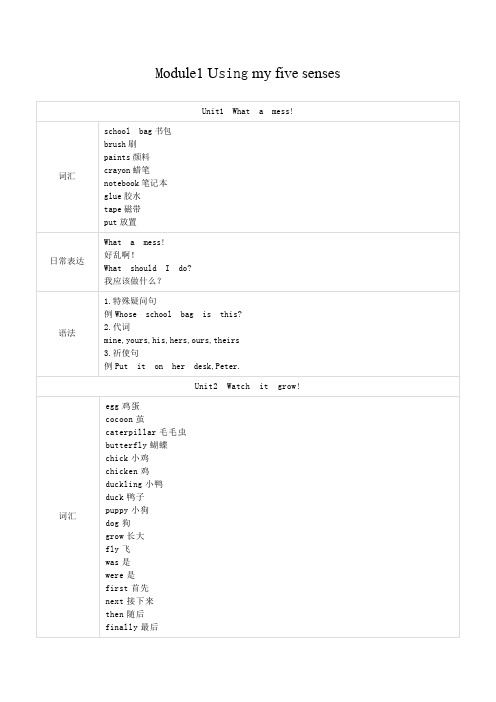
M odule1U sing my five sensesUnit1What a mess!词汇school bag书包brush刷paints颜料crayon蜡笔notebook笔记本glue胶水tape磁带put放置日常表达What a mess!好乱啊!What should I do?我应该做什么?语法1.特殊疑问句例Whose school bag is this?2.代词mine,yours,his,hers,ours,theirs3.祈使句例Put it on her desk,Peter.Unit2Watch it grow!词汇egg鸡蛋cocoon茧caterpillar毛毛虫butterfly蝴蝶chick小鸡chicken鸡duckling小鸭duck鸭子puppy小狗dog狗grow长大fly飞was是were是first首先next接下来then随后finally最后语法1.一般过去时例It was a white egg.2.一般现在时例Now it is a green caterpillar.Unit3How noisy!词汇drill钻(孔);打(眼)lorry卡车motorbike摩托车outside外面sleep睡觉another另外的noise噪音heard听到sat坐日常表达Not at all.一点也不。
语法1.特殊疑问句例What’s that noise?What can you hear?2.一般过去时例Kitty wanted to read a book.M odule2M y favourite thingsUnit1Food and drinks词汇meat肉pork猪肉beef牛肉chicken鸡肉fish鱼肉fruit水果vegetable蔬菜tomato西红柿potato土豆carrot胡萝卜cabbage卷心菜bean豆子rice米饭noodles面条bread面包water水milk牛奶tea茶orange橙子grape葡萄apple苹果banana香蕉drink饮料milk牛奶had有eat吃healthy健康的did做keep...away远离日常表达...is/are my favourite food.是我最喜欢的食物。
上海 牛津英语五年级下册 语法点详解

上海牛津英语五年级下册语法点详解一、名词的单数和复数名词是指表示事物、人或概念等的名称。
名词有单数和复数形式。
名词的单数表示一个,复数表示多个。
一般情况下,在名词后面加-s可以变成复数形式,但也有一些特殊的规则需要注意。
示例:1.单数:dog(狗)2.复数:dogs(狗)二、动词的现在时态动词用来表示一个动作或状态。
动词有不同的时态,包括过去时态、现在时态和将来时态。
现在时态指的是现在正在发生的动作或状态。
示例:1.I eat an apple.(我吃一个苹果。
)2.___.(她步行去学校。
)三、形容词的比较级和最高级形容词用来描述事物的性质或特征。
形容词有比较级和最高级两种形式。
比较级用于比较两个事物的性质,最高级用于比较三个或更多事物的性质。
示例:1.This is a big book.(这是一本大书。
)2.That book is bigger than this one.(那本书比这本大。
)3.The yellow book is the biggest.(黄色的那本书是最大的。
)四、副词的用法副词是用来修饰动词、形容词或其他副词的词语。
它可以表示时间、地点、程度、方式等含义。
示例:1.___.(他慢慢地走。
)2.___.(她唱得很好听。
)3.They often go to the park.(他们经常去公园。
)五、代词的用法代词是用来代替名词的词语。
它可以指代一个或多个人或事物,有时也可以用来指代整个句子。
示例:1.I like this book。
It is interesting.(我喜欢这本书。
它很有趣。
)2.___.(他们是我的朋友。
我们一起玩。
)六、介词的用法介词是用来表示事物之间的关系的词语。
它通常用在名词或代词前面,用来说明名词或代词与其他词语之间的关系。
示例:1.The cat is on the table.(猫在桌子上。
)2.I went to the park with my friends.(我和我的朋友一起去了公园。
(完整版)牛津英语五年级下册知识点整理,推荐文档
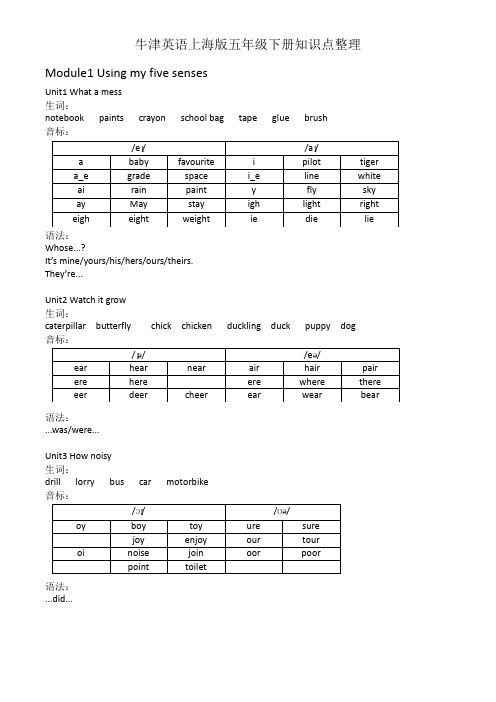
Module1 Using my five sensesUnit1 What a mess生词:notebook paints crayon school bag tape glue brush音标:语法:Whose...?It’s mine/yours/his/hers/ours/theirs.They’re...Unit2 Watch it grow生词:caterpillar butterfly chick chicken duckling duck puppy dog 音标:语法:...was/were...Unit3 How noisy生词:drill lorry bus car motorbike音标:语法:...did...Module2 My favorite thingsUnit1 Food and drinks生词:Meat: pork beef chicken fishVegetables: tomatoes potatoes carrots cabbages beans Fruit: apples oranges bananas grapesStaple Food: rice noodles breadDrinks: juice water milk tea音标:语法:What did you have for...?I had...Unit2 Film生词:ticket ticket office entrance exit seat音标:Shall we...Unit3 school subject生词:Chinese English Maths Art Music IT PE音标:It’s time for...Module3 Things around usUnit1 Signs生词:telephone toilet restaurant exit entranceNo smoking No swimming Don’t litter Don’t walk on the grass 音标:语法:What does this sign say/mean?It says/means we can/can’t/mustn’t/shouldn’t..Unit2 Weather生词:Cloud/cloudy sun/sunny rain/rainy wind/windysnow/snowy storm/stormy fog/foggy 30℃/thirty degrees音标:语法:What’s the weather like? What’s the temperature?It’s...(weather).It’s...(temperature).Unit3 Changes生词:Cupboard bookshelf bed mirror lamp cushion sofa 音标:语法:What can we do?Module4 More things to learnUnit1 Museum生词:Science museum art museum history museum Insect museum car museum railway museum 语法:Which museum do you want to visit?I want to visit ...Why?Because...Unit2 Western holiday生词:Christmas Easter Halloween Thanksgiving 语法:When is ...?It’s on ...What do people do on this holiday?Unit3 story time生词:giant castle。
最新牛津英语五年级下册英语语法知识汇总-(1)

英语语法知识汇总-五B 第一课时——名词复数重点:名词的复数变化规则。
难点:灵活运用。
这里强调两点:不可数名词都默认为单数,所以总是用is.1.一般+s 如map→maps , bag→bags 等2.特殊:以s,x,sh,ch 结尾的单词+es 如bus→buses , watch→watches 等;3.以辅音字母+y 结尾,去掉y 加上ies ,以元音字母+y 结尾加上s4.以f 或fe 结尾,去掉f/fe 加上ves 。
如 knife→knives leaf→leaves wolf→wolves wife→wives life→lives thief→thieves5.有时可数,有时不可数:典型例词:fish 当它解释为鱼肉时是不可数名词,当它解释成同一种鱼时,单复数同形,复数即为fish ,当它解释为不同一种鱼时,+es,即为fishes.6.以o 结尾,a) photo→photos ,piano→pianos,radio→radios ,zoo→zoos b )加es 的名词有:potato→potatoes tomato→tomatoes7.特殊词:child---children(小孩) man--men (男人) woman--women(女人) 8.单复数同形(单数和复数一样)people(人)sheep(绵羊) deer (鹿)) 9.国人变复数 :口诀:中日不变英法变,其余s 加后面。
Chinese--Chinese Japanese--JapaneseEnglishman--Englishmen Frenchman--Frenchmen American--Americans 等等10. 字母、数字、引语、缩略语变复数,在其后加s 或's 。
eg. There are two t's in the word “bottle".各种不同情况 变化方法 例词一般情况直接加-sbook-books bag-bags cat-cats bed-beds 以s. x. sh. ch结尾加-esbus-buses box-boxes brush-brushes watch-watches peach —peaches glass--glasses以“辅音字母+y”结尾变y 为i, 再加-es family-families study--studies以“f 或fe”结尾变f 或fe 为v ,再加-esknife-knives不规则名词复数man-men woman-women policeman-policemen policewoman-policewomen mouse-mice foot-f eet child-children fish-fish Chinese-ChineseThere are two 1's i n the number “2011".一、用所给的单词的复数的正确形式填空: 1> There are three ______(chair) in the classroom. 2>These _______(tomato) are red.3>My brother looks after two ______(baby) 4> My father likes to eat _______(potato). 5>Chinese ______(people)like to eat noodles. 6>I have a lot of ______(toy) in my bedroom.7>I help my mother wash ______(dish) in the kitchen. 8>I have two ______(pencil-box).9>There are some ______(bus)in the street. 10>Peter has eight _____(foot). 二、选择填空( )1.I can see three ________ in the zoo. A monkeys B monkeyes C monkey ( )2.The pig has four ______. A. foot B. feet C. foots( )3.My two brothers are both ______. A. policeman B. policemans C. policemen ( )4.I can see ten _____ in the picture. A. sheep B. dog C. pig( )5.The _____ has three__. A. boys, watches B. boy, watch C. boy, watches ( )6.Can you see _______on the plate? A. bread B. breads C. breades( )7.The girl often brushes her_____ before she goes to bed. A. tooth B. tooths C. teeth ( )8.Mr Black often drink some _________.A. milk B. milks kes ( )9.There are some _____on the floor. A. child B. water C. books( )10..Lucy will show us some new ____ of hers. A. photo B. photos C. Photoes 第二课时——2、人称代词和物主代词重点:区分人称代词和物主代词。
牛津版英语五年级下册知识点.doc

牛津版英语五年级下册知识点【篇一:牛津版英语五年级下册知识点】牛津版五年级下册英语语法知识点归纳语法点归纳:1. like + 动名词如:like swimming2. like + 名词的复数如:like masks3.go + 动名词如:go climbing4.how many + 名词复数如:how many watches5.different + 名词复数如:different countries6.same 前加the , 后面一般跟单数,如:the same hobby7.序数词前一定加the , 如:the first day8.在几点用at, 如at 7 o ’clock在, 某一天或某一天的具体时间段用on , 如:on sunday, on sunday morning, 直接在早上、下午或晚上用in, 如:in the morning9. 动词后代词用宾格(动宾)如:join me10. 介词后代词用宾格(介宾)如:with him ,to her11.want to + 动原,would like to + 动原,sorry to + 动原,forget to + 动原,it ’s time to +动原,12.情态动词can 后面加动原,let 后加动原13.祈使句中动词用原形,否定句在句首加don’t14.助动词(do does don ’t doesn ’后t )动词用原形15.形容词加名词(形名) 如:a beautiful girl16.动词加副词(动副) 如:dance beautifully17.some 用于肯定句,any 用于否定句18.there be 结构就近原则如:there is a teacher and some students in the classroom.19.不可数名词:water coffee tea milk juice bread rice food fruit paper chocolate exercise fish20.乐器前加the, 球类前不加the, (play the 乐器,play 球类)如:play the piano, play football21.who 当作特殊的第三人称单数为大家整理的五年级下册英语语法知识点就到这里,更多小学生辅导相关内容请随时关注学而思网校小学频道!。
2021年沪教牛津版(三起)五年级下英语知识点梳理-必会词汇、必会句型归纳拓展讲解总结

2021年沪教牛津版(三起)五年级下英语知识点梳理-必会词汇、必会句型归纳拓展讲解总结五年级全册英语知识点梳理五年级全册英语知识点梳理一.必考词汇一.必考词汇1.名词future将来;未来pilot飞行员job工作;职业singer 歌手lifeguard救生员Ms女士journey旅程;旅行underground地铁station车站hour小时party聚会thing东西;事物hat帽子class班;班级word单词life生活bedroom卧室kitchen厨房bathroom浴室;卫生间light灯;光TV电视;电视机bedtime就寝时间beach海滩sunshine阳光shell贝壳sea海letter信year 年岁;年outing远足map地图hill小山diamond钻石lake湖hole洞key钥匙left左边hospital医院road路;马路windmill 风车wind-bell风铃paper纸;纸张tap水龙头vegetable蔬菜clothes衣服;服装farmer农民drop滴;水珠mountain山;山脉tree树ground地面fire火;火灾safety安全match火柴heat热;高温sock短袜cap帽子crayon彩色蜡笔或粉笔.铅笔umbrella伞place地方future将来;未来machine机器rcise运动;锻炼;活动storybook故事书story故事dictionary字典;词典magazine杂志newspaper报纸week周;星期student学生weekend周末film电影boat小船;舟holiday假日;假期seafood海鲜hotel旅馆island岛plan安排;计划hall礼堂trousers裤子sweater毛衣coat外套;大衣shoe鞋smile笑容;微笑money钱laugh大笑headache头痛fever发烧;发热medicine药rest休息toothache牙痛present礼物world世界invention发明;创造watch手表camera相机festival节日end 结尾;结束village村庄wall墙;围墙2.动词want想要teach教课fall掉落;落下save救;救助;节约become变成;变得walk走;步行take乘坐交通工具;带领begin开始bring带来visit看望;拜访;参观cross穿越;越过carry背;提;拿say说ask问answer回答watch观看;观察enjoy 享受的乐趣collect收集put放;安置know知道find发现;找到think想turn转向;转弯blow刮;吹move使改变位置;移动cut剪;砍;切use使用shine照耀burn燃烧;烧hurt使受伤must必须smoke吸烟hate讨厌let让stand站;站住will将;将会buy买stay待;暂住;逗留build建筑;建造cry哭;喊叫meet迎接;会见show给看keep保持should应该travel旅行;长途行走invent发明call把叫做through穿过3.形容词favorite最喜欢的interesting有趣的clever聪明的same相同的heavy重的;沉的different不同的bored无聊的easy容易的their他们的;她们的;它们的funny滑稽的;好笑的right名词右边;形容词正确的quiet轻声的;安静的useful有用的careful小心的clear清澈的ill生病的;不舒服wrong有毛病;不正常;错误的important重要的kind友好的;体贴的4.介词by表示方式;靠近after在后before在以前between 在中间up向上;在上面over在上方inside在里面5.副词when什么时候then然后;那么soon很快;不久quite 相当;分along沿着;顺着straight笔直地gently和缓地;温柔地softly轻柔地strongly强劲地happily快乐地slowly缓慢地quickly快地;迅速地why为什么then然后early早;提早hard 努力地tomorrow明天until直到finally最后which哪一个;哪一些only只有;仅anywhere任何地方6.其他cook厨师;烹饪sound名词声音;动词听起来好像tidy 整理;整洁的change改变;变化study书房;学习because因为every每;每个next紧接着;随后;紧接着的7.短语taxidriver出租车司机begoodat擅长primaryschool 小学busstop公共汽车站bybus乘公共汽车farfrom离远onfoot 步行bybike骑自行车bycar乘小汽车getoff下车havefun尽情玩onholiday度假haveagoodtime玩得高兴atthetopof在顶部getthrough通过postoffice邮局flowershop花店toyshop玩具店getto到达8.频率副词usually通常often经常sometimes有时always 总是;一直never从不9.代词both两个都myself我自己10.短语playsport做运动goshopping去购物eachother互相makephonecalls打电话livingroom客厅modelplane飞机模型dohomework做家庭作业turnoff关掉watchTV看电视tellastory 讲故事growcrops种庄稼putoutfires灭火burndown烧毁becarefulwith当心notatall一点也不diningroom餐室;餐厅tidyup把整理好befullof装满;充满afew几个;一些wildgoose大雁复数wildgeeseinthefuture将来infrontof在前面takeaphoto拍照wearglasses戴眼镜beweakin不擅长notanymore不再allday一天到晚dorcise做运动overthere在那边doasurvey做调查actout表演seeafilm看电影rowaboat划船howlong多久goswimming去游泳inthesouthof在的南部allyearround一年到头schoolgate校门;校门口artroom美术室meetingroom会客室;会议室tryon试穿衣物puton穿;戴keepquiet保持安静havealook看一看haveaheadache头疼haveafever发烧haveacold感冒havearest休息一下getwell康复haveatoothache牙疼haveameeting开会pullout把拔出farawayfrom远离attheendof在的最后noentry禁止进入bekindto对友好knockdown推倒;拆掉redpacket红包11.限定词another另一个last最后的12.12.名词性物主代词名词性物主代词yours你的;你们的mine 我的hers她的theirs他们的;她们的;它们的二.必考句型二.必考句型1.Whatdoyouwanttobe你想要成为什么Iwanttobeapilot.我想要成为一名飞行员。
上海牛津英语五年级下册 语法规则整理
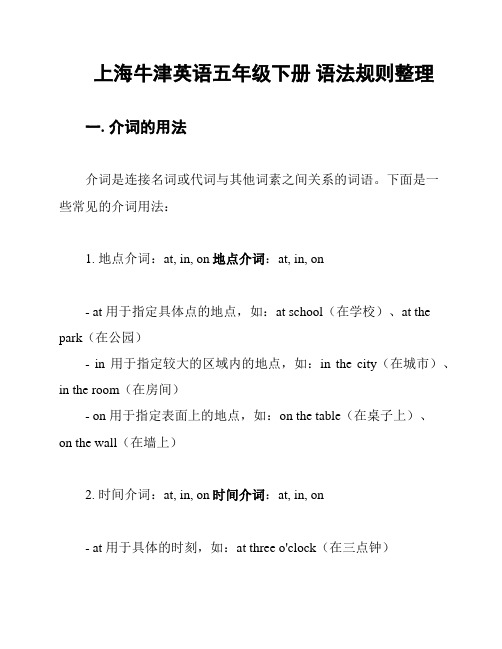
上海牛津英语五年级下册语法规则整理一. 介词的用法介词是连接名词或代词与其他词素之间关系的词语。
下面是一些常见的介词用法:1. 地点介词:at, in, on地点介词:at, in, on- at 用于指定具体点的地点,如:at school(在学校)、at the park(在公园)- in 用于指定较大的区域内的地点,如:in the city(在城市)、in the room(在房间)- on 用于指定表面上的地点,如:on the table(在桌子上)、on the wall(在墙上)2. 时间介词:at, in, on时间介词:at, in, on- at 用于具体的时刻,如:at three o'clock(在三点钟)- in 用于较长的时间段,如:in May(在五月)、in the morning(在早上)- on 用于特定的日期或星期几,如:on Monday(在星期一)、on May 1st(在五月一日)3. 方式介词:by, with方式介词:by, with- by 用于表示通过某种方式或交通工具,如:by bus(乘坐公交车)、by foot(步行)- with 用于表示使用某种工具或伴随某人一起,如:write witha pen(用钢笔写)、play with friends(和朋友一起玩)二. 形容词的比较级和最高级形容词用来描述事物的特征、性质或状态。
比较级用于比较两个事物的程度或大小,最高级则表示在同一类事物中程度或大小最高的。
下面是形容词比较级和最高级的构成规则:1. 单音节形容词:比较级在词尾加-er,最高级在词尾加-est,如:big(大)- bigger(更大)- biggest(最大)单音节形容词:比较级在词尾加-er,最高级在词尾加-est,如:big(大)- bigger(更大)- biggest(最大)2. 以-e结尾的形容词:比较级在词尾加-r,最高级在词尾加-st,如:nice(好)- nicer(更好)- nicest(最好)以-e结尾的形容词:比较级在词尾加-r,最高级在词尾加-st,如:nice(好)- nicer(更好)- nicest(最好)3. 双音节形容词和部分三音节形容词:比较级在形容词前加more,最高级在形容词前加most,如:beautiful(美丽)- more beautiful(更美丽)- most beautiful(最美丽)双音节形容词和部分三音节形容词:比较级在形容词前加more,最高级在形容词前加most,如:beautiful(美丽)- more beautiful(更美丽)- most beautiful(最美丽)需要注意的是,有些形容词的比较级和最高级是不规则变化的,需要单独记忆,如:good(好)- better(更好)- best(最好)、bad(坏)- worse(更坏)- worst(最坏)。
- 1、下载文档前请自行甄别文档内容的完整性,平台不提供额外的编辑、内容补充、找答案等附加服务。
- 2、"仅部分预览"的文档,不可在线预览部分如存在完整性等问题,可反馈申请退款(可完整预览的文档不适用该条件!)。
- 3、如文档侵犯您的权益,请联系客服反馈,我们会尽快为您处理(人工客服工作时间:9:00-18:30)。
上海牛津英语五年级下册语法点整理
动词的形式:
一、动词后面加上ing :
①、现在进行时:表示某个动作正在发生或进行。
它的构成方式是:主语+be+动词ing〔现在分词〕形式,有时会要求自己加上be动词(is, am , are )。
句子中经常会出现look, listen, now……等词。
现在进行时的变化
肯定句式:主语+be( am, is, are)+动词ing+其它.
否定句式:主语+be(am, is, are) +not +动词ing+其它.
一般疑问句:Be(am, is, are) +主语+动词ing +其它?
特殊疑问句:疑问词(what , where…)+be(am, is, are)+主语+动词ing +其它?对现在进行时的特殊疑问句的回答,它不可以用Yes或No直接作答,要根据实际情况回答。
练习:1. What are you _________(do) now? I ___________(eat) bread.
2. It’s nine o’clock.. My father_______________(work) in the office.
3. Look, the boy____________(put) the plate on his finger.
4. __________he__________(clean) the classroom? No, he isn’t. He____________(play).
5. Where is Mak? He___________(run) on the grass.
6. Listen, who___________(sing) in the music room? Oh, Mary___________(sing) there.
②like(s), go , do some , 后面的动词加ing.
如:1. I like (play ) football, but my father likes (play) chess.
2.Let’s go (swim).
二、动词后面加s/es. 这就有关一种时态:一般现在时。
一般现在时:表示经常性的事情。
时间状语:often经常, usually通常, always总是,every每个, sometimes有时,
at…在几点钟
它的动词变化与主语人称有关,只有肯定句中第三人称单数用动词三单(动词加s/es),其余动词均用原形。
在否定句和问句中,因为有助动词do, don’t , does , doesn’t,所以后面的动词用原形。
三单变化:多数在动词后加s play—plays like—likes
以s,x,sh,ch,o结尾的动词加es go—goes wash—washes watch--watches
以辅音字母加y结尾,把y改i再加es fly—flies study—studies
一般现在时的变化:
1、肯定句:主语(非三单)+动原+其它/ 主语(he , she )+动词三单+其它。
2、否定句:主语(非三单)+don’t+动原+其它/ 主语(he , she )+动原+其它。
3、一般疑问句:Do +主语(非三单)+动原+其它/ Does +主语(he, she )+动原+其它。
4、特殊疑问句:特殊疑问词(What, Where …)+do +主语(非三单)+动原+其它
特殊疑问词(What, Where…)+ does +主语(he , she )+动原+其它。
练习:1. We often___________(play) in the playgound.
2. He _________(get) up at six o’clock.
3. __________you _________(brush) your teeth every morning?
4. What (do) he usually (do) after school?
5. Danny (study) English,Chinese,Maths,Science and Art at school.
6. Mike sometimes __________(go) to the park with his sister.
7. At eight at night, she __________(watch) TV with his parents.
8. ________ Mike________(read) English every day?
9. How many lessons_________your classmate________(have) on Monday?
10. What time_________his mother_________(do) the housework?
11. What you usually (do ) on Sundays ?
12. He ( not like ) ( drink ) tea .
13. They (not like ) ( play ) cards.
三、动词用原形的名显特征有:1、在can , can’t, let’s , shall we 后面用原形。
2、助动词do , don’t , does , doesn’t 后面动词用原形。
练习:1、He can ( put ) an egg on his mouth .
2. Let’s ( clean ) the library now.
3. Shall we (have ) lunch at eleven o’clock?
4. Does your uncle (water) flowers every day ?
总练习:用所给动词的适当形式填空:
1. Wang Bing is (write) an e-mail to his friend in the study.
2. I (play) the piano, my brother (watch) TV now.
3.He can (swim), but I (not),I can (ski).
4.Let’s (go) and (play) basketball .
5.Shall we (clean) the classroom now.
6.I (like) (skate),my parents (not),they (like) (swim).
7.Miss Green (like) (dance) very much.
8. (do) Uncle Wang (run) fast?
9.GaoShan often (go) (swim) in Summer(夏天).
10.Do you (have) (some) (bobby)? Yes, I (do).
11 (do) your father (watch) TV in the evening?No, he (not).
12.This is Helen (speak).
13.Tom usually (play) football after school.
14.He (live) in a small town near Nanjing.
15.Pingping (write) an e-mail to his friend now.
16.What (do) Nancy usually (do)? She usually (grow) flowers .
17. My father ___ __(like) that song very much. He often ___ __(sing) it.
18. ________he ________(watch) TV in the evening? No, he ________
19. My parents usually________(get) up at 6. My sister _______(get) up at 6:15, and I usually _________(get) up at 6:30
20. _______your father _______(fly) kites over there now? Let me see. Yes, he ______. He often ________(fly) kites there. Shall we ______(go) to have a look?
21. My aunt (not like ) ( cook ).。
